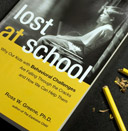What's Different? |
 “We cannot ignore difficult student behaviors any longer. Dr. Greene's book is a timely contribution to the literature on how schools must support all students.” Dr. Rachel Brown-Chidsey |
What’s different about Lost at School?
The model of care described in Lost at School was first articulated in Dr. Greene’s previous book, The Explosive Child, which has been read by hundreds of thousands of teachers, parents, and mental health clinicians. The approach sets forth two major tenets. First, challenging behavior in kids is best understood as the byproduct of lagging cognitive skills – for example, in the domains of flexibility/adaptability, frustration tolerance, and problem solving -- rather than as attention-seeking, manipulative, limit-testing, or a sign of poor motivation. Second, these challenges are best addressed by teaching children the skills they lack (just as you would with any other developmental delay) and helping them solve the problems that reliably and predictably precipitate their challenging episodes. Challenging kids let us know they’re struggling in some fairly common ways -- screaming, swearing, defying, hitting, spitting, throwing things, breaking things, crying, withdrawing, and so forth – but they are quite unique as individuals when it comes to the mix of lagging cognitive skills and “unsolved problems” that set the stage for these behaviors. One of the biggest favors an adult can do a challenging kid is to identify the lagging skills and unsolved problems contributing to the kid’s challenging behavior (if the kid is exhibiting challenging behavior, it’s a pretty sure-fire bet that no one’s figured these things out yet!). There are several instruments that can be helpful along these lines, including the (revised and updated) Assessment of Lagging Skills and Unsolved Problems (ALSUP), the Plan B Flowchart, and the Plan B Cheat Sheet. These can be found on a different website...just CLICK HERE. Teaching these skills and helping kids solve problems is typically accomplished by helping challenging kids and their adult caretakers learn to solve problems in a collaborative, mutually satisfactory manner. As described in Lost at School, this involves three basic ingredients. The first ingredient involves identifying and understanding a kid’s concern about or perspective on a given issue (such as difficulty completing homework, getting along with a particular classmate, or getting started on class work). The second step involves identifying the adults’ concerns on the same issue. In the third step, adult and kid brainstorm solutions together, with the ultimate goal of agreeing on a plan of action that addresses the concerns of both parties. Where can I find more information? |
From Lost at School:
"In the same way that kids who are delayed in reading are having difficulty mastering the skills required for being proficient in reading, challenging kids are having difficulty mastering the skills required for becoming proficient in handling life’s social, emotional, and behavioral challenges. Why have we been so zealously over-applying consequences to kids with behavioral challenges? Because we didn’t realize they had a developmental delay.” |